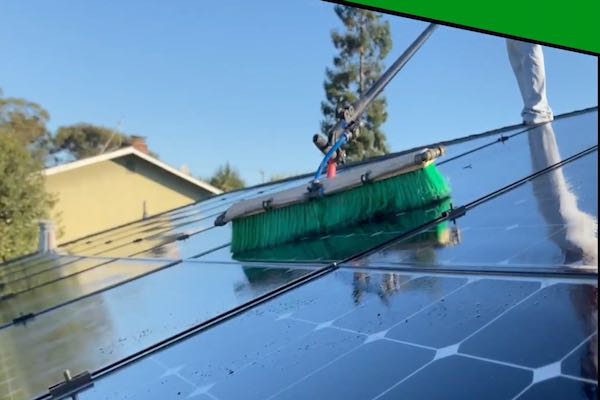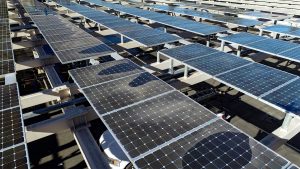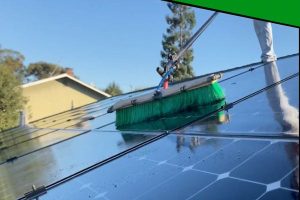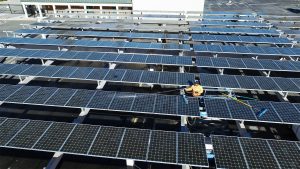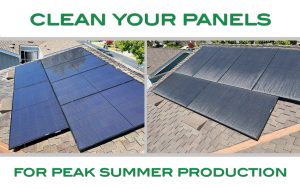Solar panels are a brilliant investment in renewable energy, but keeping them in top shape requires a little effort. Dust, bird droppings, and even snow can reduce their efficiency. One study conducted by the National Renewable Energy Laboratory (NREL) looked at the effect of dirt on solar panel efficiency. Energy lost annually to soiled solar panels was estimated to be up to 7% in the United States! That might not sound like much, but if you factor that over thousands of solar installations over years of time you can start to see that dirty solar panels can have a huge effect on the systems energy efficiency. Regular cleaning and maintenance are key to maximizing your energy output.
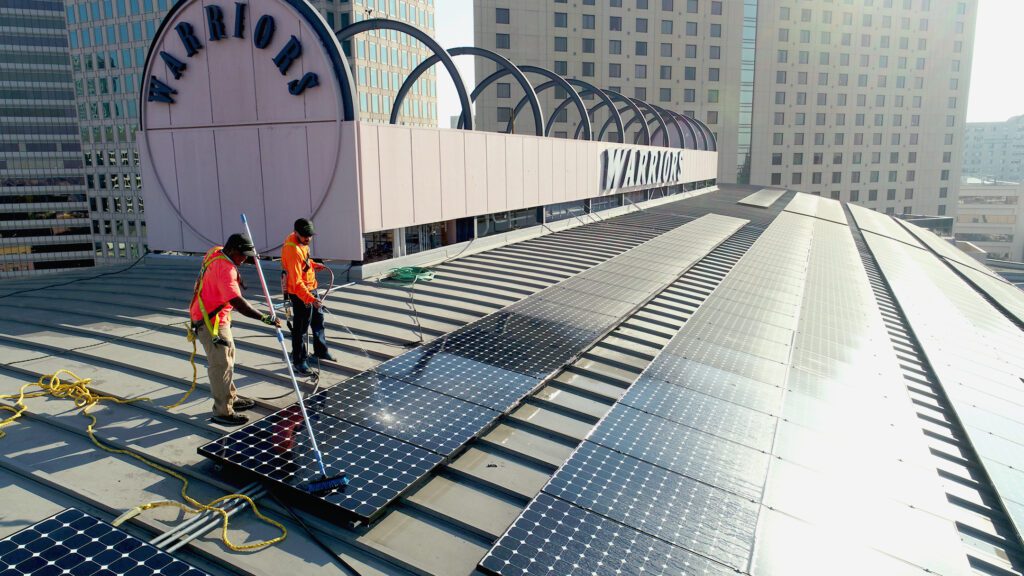
It isn’t a complicated process, but it isn’t as simple as turning on the wiper blades to clean your vehicle windshield. Fear not. We’ll break down everything you need to know about maintaining clean and efficient solar panels, including:
Why Clean Solar Panels?
A deeper dive into how dirt and grime impact your solar panel’s efficiency and why regular maintenance keeps your energy production optimized.
Safety First! Preparing to Clean Your Solar Panels
Cleaning solar panels can be risky if proper precautions aren’t taken. We’ll share tips to ensure you stay safe during the process.
When and How Often Should You Clean Solar Panels?
The time of year and time of day makes a difference. Learn how your environment will affect your cleaning schedule.
How Do You Clean Solar Panels?
What do you use for cleaning solar panels? From basic tools like soft brushes to advanced techniques like automated cleaning systems, we’ll explain the best methods to clean your panels effectively and safely.
Step By Step Guide to Cleaning
Jump to this section if you just want to learn the simple process. We have also done short DIY instructional videos and additional posts on the subject.
When to Call the Pros and Solar Maintenance
Regular cleaning can also reveal underlying issues with your solar installation. Find about what to look for and why you might want to hire a professional to clean your solar panels.
So let’s begin.
Why Clean Solar Panels Matter
Keeping your solar panels clean is essential for maintaining efficiency. Dirty panels can significantly reduce the amount of electricity generated.
Dirt and grime accumulate over time, creating a barrier between the sun and your panels. Why is that? During the day dust becomes airborne. At night, especially in the Bay Area of California where we are located, dew forms and the dust goes through a process called cementation. This barrier blocks sunlight, limiting the amount of energy produced.
There are several factors that contribute to dirty panels:
- Dust and pollen, which accumulate faster in certain environments.
- Bird droppings, which can cause stubborn stains.
- Nearby trees that shed leaves and sap.
In addition to these factors, weather conditions also play a role. Rain can wash away some dirt but it doesn’t remove everything.
Regular cleaning not only boosts energy production but also extends the lifespan of your panels. A clean panel operates more efficiently, potentially saving you money in the long run.
Safety First: Preparing to Clean Your Solar Panels
Before you start cleaning your solar panels, safety should be your top priority. Begin by turning off your solar power system. This step is crucial to avoid any electrical hazards during the cleaning process.
Next, choose the right time to clean. Ideally, you should clean your panels in the early morning or late afternoon. This time is better as the panels won’t be too hot. This lowers your chance of injury from heat as panels can get up to nearly 150° F (65.5C)!
Wear appropriate safety gear, including gloves and non-slip shoes, to protect yourself while working. If your panels are on the roof, ensure that your ladder is stable and secure, and use a safety harness if necessary.

Photo by Gabriel Alenius on Unsplash
Lastly, check for any loose wires or damage before you begin. Identifying these issues early ensures a safe cleaning process and helps you address any maintenance needs promptly. Adopting these safety measures makes the cleaning process both safe and effective.
The Best Time for Solar Panel Cleaning
Time of Year and Frequency
Typically we recommend that you clean your panels twice a year. Once during the fall, after most debris has fallen, and then again at the end of spring, just before the peak solar season. Some customers have their panels cleaned at the beginning of each season. Others opt for just once a year before summer. A lot depends on where your home is located and how dusty and dirty your surroundings are. Are they grading a field to build homes next to you? Do you live in the country down a dirt road? Then you will want to opt for more frequent cleaning. Are you in the suburbs in a well established neighborhood? You could probably get away with washing solar panels once or twice a year.
Time of Day and Tips
Selecting the right time to clean your solar panels can make a significant difference. Early morning or late afternoon are ideal periods for cleaning. During these times, the panels are cooler, minimizing the risk of thermal shock.
Cleaning on an overcast day is also beneficial, as it prevents the sun from drying water too quickly. This helps avoid streaks and water spots, ensuring a clearer finish.
Avoid cleaning on windy days to prevent dust and debris from interfering with the process. Choosing the optimal time ensures that your cleaning efforts are both efficient and effective.
Tools of the Trade: Solar Panel Cleaning Equipment
Utilizing the proper tools is essential when cleaning your solar panels. The right equipment not only aids in effective cleaning but also helps prevent damage to the panels. A good starting point is acquiring a high-quality solar panel cleaning brush.
Consider materials that are non-abrasive to avoid scratching the surfaces. A soft brush with long, gentle bristles works best in reaching corners and edges without leaving marks. A telescopic handle is beneficial for accessing higher panels with ease. Or just a nice extension handle would work fine. Something like this brush on Amazon is an inexpensive option that would work great.
When assembling your cleaning toolkit, a water hose and squeegee are also invaluable. The hose helps deliver a gentle stream for rinsing. Consider a squeegee for a thorough dry-off. It helps remove water without leaving marks, keeping your solar panels spotless for peak performance.
Additional Solar Panel Cleaning Tools
Beyond the brush, hose, and squeegee a variety of tools can enhance your cleaning effort. Pros sometimes use a special brush with a water hose incorporated into the design to make it easier to maneuver on a roof (see photo above). These are more expensive and require additional equipment to operate.
Another useful item is a deionized water filter, which prevents mineral spots post-cleaning. This can also be a more costly purchase but it will save you from having to squeegee every panel. Check out this option on Amazon.
Also, opt for eco-friendly dish soap diluted in water to further protect your panels and the environment. Some towels or micro fiber clothes will help dry areas hard to get with the squeegee. This is an important step if you aren’t using deonized water as hard water can leave spots on your photovoltaic (PV) cells blocking potential solar energy.
Step-by-Step Guide to Cleaning Your Solar Panels
Maintaining clean solar panels can significantly enhance their efficiency. Here’s a comprehensive guide to ensure your panels are in top condition.
Start by gathering your tools. Ensure you have a solar panel cleaning brush, hose, and non-abrasive cloth. Also, grab some eco friendly dish soap and a squeegee if needed.
Step 1: Initial Inspection and Debris Removal
Begin with a careful inspection of your panels. Look for visible dirt, bird droppings, or other debris.
Use a leaf blower if necessary to gently remove loose particles. This step will prepare the surface for thorough washing.
Step 2: Washing the Solar Panels
Now, use a hose to spray the panels lightly. Avoid using high-pressure water jets which can damage the surface.
Apply a cleaning solution of dish soap diluted in water if necessary. Use the solar panel cleaning brush to gently scrub, focusing on areas with tough grime.
Step 3: Rinsing and Drying
Now rinse the panels with water. Use gentle, even motions to ensure all soap residue is removed.
Next, you may want to use a squeegee to dry the panels completely, ensuring no water streaks or droplets are left behind. The easiest way to do this is to start at one side of the panel with the squeegee and pull from the top edge to the bottom edge. Move to the left or right and repeat until you have covered the entire panel.
Finally, use a microfiber cloth or towel to dry the edges missed by the squeegee.
Step 4: Post-Cleaning Inspection
After cleaning, inspect the panels for any missed spots or damage. Look for scratches or cracks that might have occurred during cleaning.
Document any issues for maintenance records. This will help in tracking panel health and scheduling future maintenance checks efficiently.
When to Call in the Professionals
Sometimes, cleaning solar panels is best left to experts. Professional cleaning services have specialized tools and experience to handle complex situations.
Consider hiring professionals if your solar panels are difficult to access safely. We can reach heights and angles that are challenging and risky for homeowners.
Another benefit of hiring a professional is that we can assess the state of your solar installation. If your panels show signs of damage, such as cracks or pressure spots, we can provide repairs. This will ensure your system runs smoothly without compromising the warranty or system integrity.
Solar Panel Maintenance Between Cleanings
Regular cleaning is just one part of solar panel care. Monitoring your system’s performance ensures you catch issues early. For example, companies like Synergy Power offer professional maintenance services to keep your system running at peak performance. Maintenance between cleanings can extend your solar panels’ efficiency and lifespan.
A few simple steps will keep your system in excellent condition.
- First, regular visual inspections are key. Look for any obstructions, such as dirt or leaves, that could obstruct sunlight and reduce efficiency.
- Second, trim nearby trees and bushes to prevent shade and falling debris on your solar panels. Keeping the surrounding area clear can improve performance and reduce cleaning frequency.
- Third, conduct a brief check of any monitoring systems that track your solar panel output. Sudden drops in performance can indicate cleaning or maintenance needs.
Here are a few more maintenance tips:
- Ensure gutters near solar panels are clear to prevent overflow.
- Inspect for damage after severe weather.
- Check the integrity of panel mounts and electrical connections.
These small steps prevent minor issues from becoming costly problems. Regular maintenance keeps your solar system performing at its best.
The Environmental and Financial Benefits of Clean Solar Panels
Clean solar panels contribute to environmental sustainability. They capture sunlight more efficiently, reducing reliance on fossil fuels and decreasing carbon footprint.
Financially, maintaining clean panels ensures maximum energy output. This leads to higher savings on electricity bills and faster return on investment.
Moreover, a well-maintained solar panel system can increase your property’s value. Potential buyers often seek energy-efficient homes with lower utility costs. Keeping your solar panels clean and efficient adds an attractive selling point.
From self-cleaning coatings to robotic systems, the future of solar maintenance is exciting. Stay informed about emerging technologies that could make maintenance easier and more efficient.
Frequently Asked Questions: Cleaning Solar Panels FAQ’s
What do you use for cleaning solar panels?
Use soft-bristle brushes like ones you would use to wash a car or a squeegee. Attach them to a long pole to safely reach panels.
What cleaning products are safe for solar panels?
Water is totally fine but if you want to use soap use a mild dish soap. Avoid abrasive cleaners and harsh chemicals like bleach that could damage the panels.
Can I use dish soap to clean solar panels?
Yes, dish soap is a gentle and eco-friendly option. Be sure to rinse thoroughly to prevent residue that might affect performance.
Can I just rinse my solar panels?
Rinsing with water can remove loose dirt but might not tackle stubborn grime. For a more thorough clean, use soft-bristle brushes and a little dish soap as needed. Rinsing is an excellent maintenance step between deep cleanings.
Does the rain clean solar panels?
Absolutely! But if you have a lot of dirt that has been baked on you will need to agitate the dirt to remove it.
Should I use Windex on solar panels?
No, avoid Windex and other ammonia-based cleaners. They can leave residues that may reduce panel efficiency.
How can I clean roof-mounted solar panels automatically?
Consider automated solutions like sprinkler systems or robotic brushes for hands-free maintenance. While convenient, these systems can be costly and may require periodic maintenance.
How do professionals clean solar panels?
Professionals often use deionized water systems, a squeegee, and or a water fed pole systems with extendable brushes like a Tucker pole.
What should I avoid when cleaning solar panels?
- Abrasive tools: Hard bristles can scratch the surface.
- Harsh chemicals: Bleach and ammonia-based cleaners can harm the panels.
- Pressure washers: High-pressure water can damage solar cells.
- Hot weather: Cleaning during high heat can stress panels due to sudden temperature changes.
- Walking on panels: This can break the glass or damage internal components. Ideally, avoid climbing onto the roof altogether for safety.
By keeping up with maintenance and using these simple recommendations you can make your solar panels last longer. This will help you get more energy and enjoy the full benefits of renewable energy. Start your journey toward a cleaner, greener future—your solar panels (and the planet) will thank you!
Need to book a professional to clean your solar panels? Contact us here.

